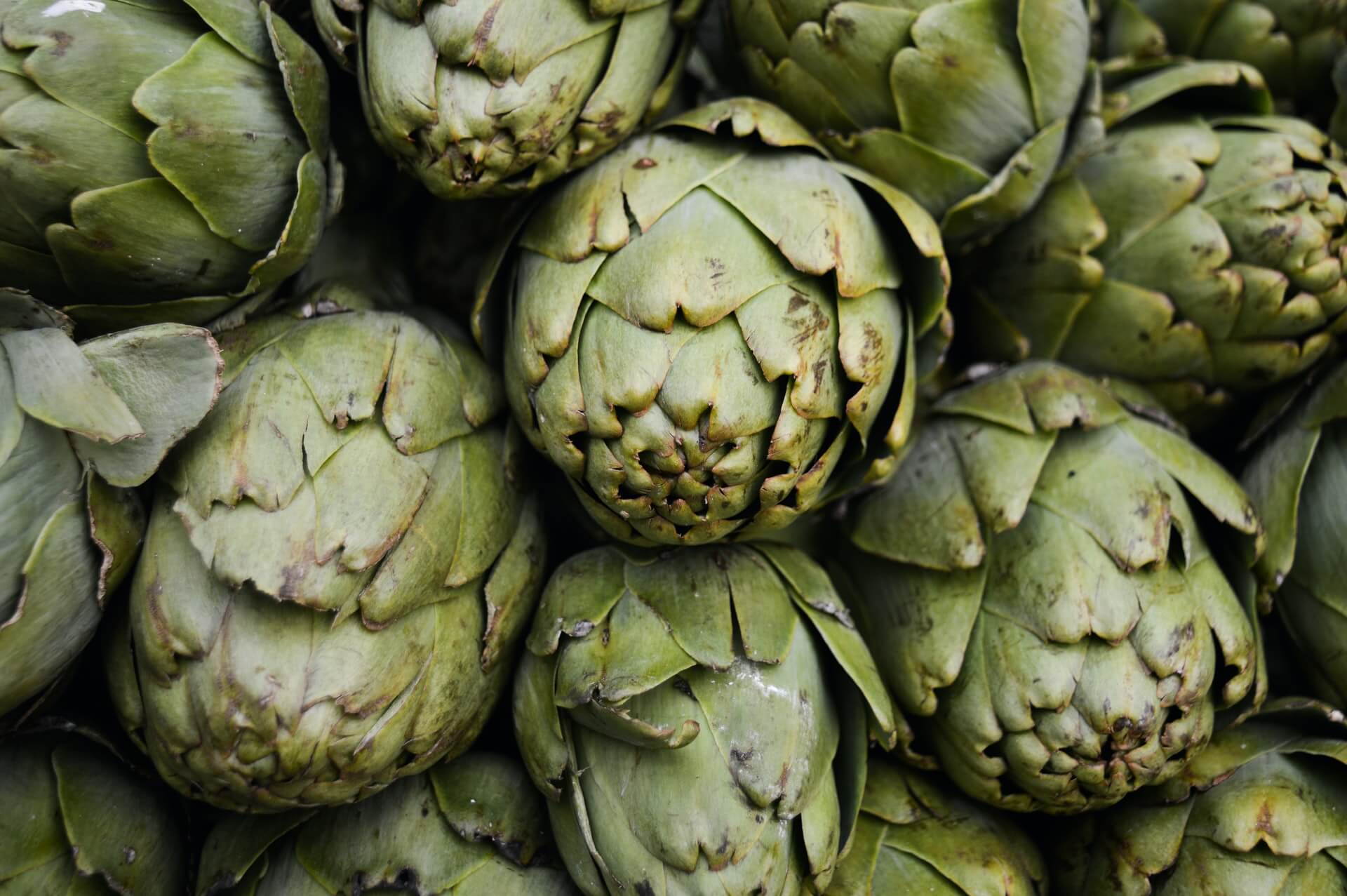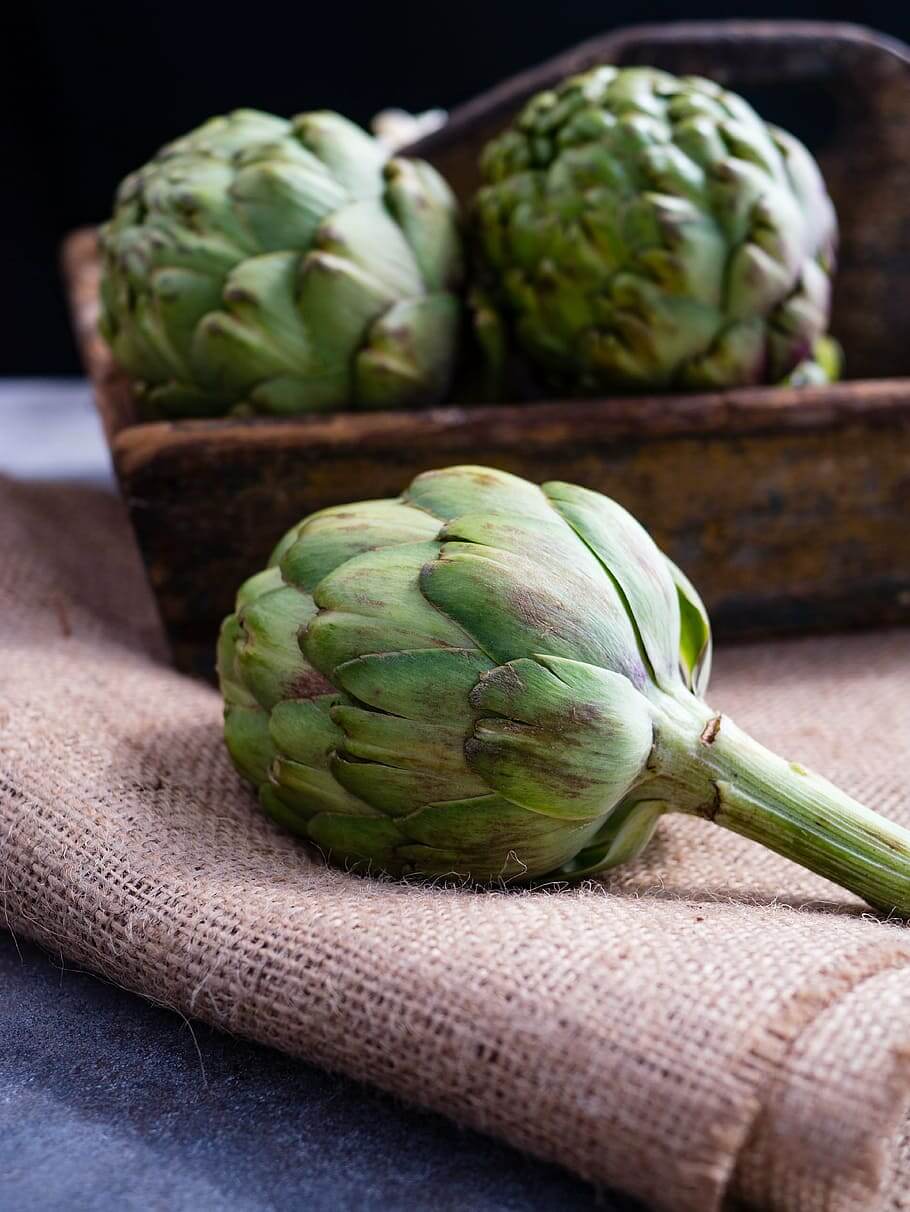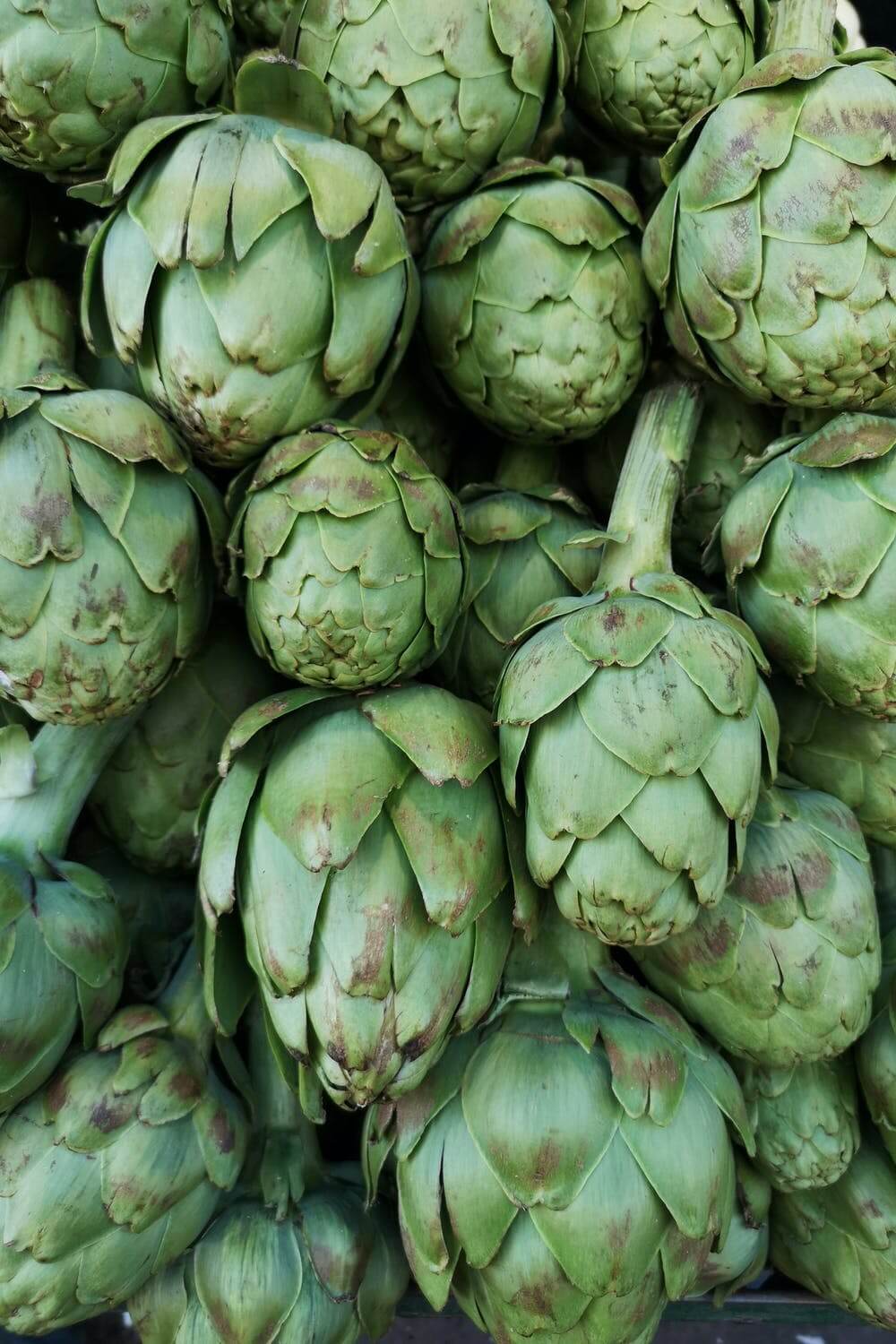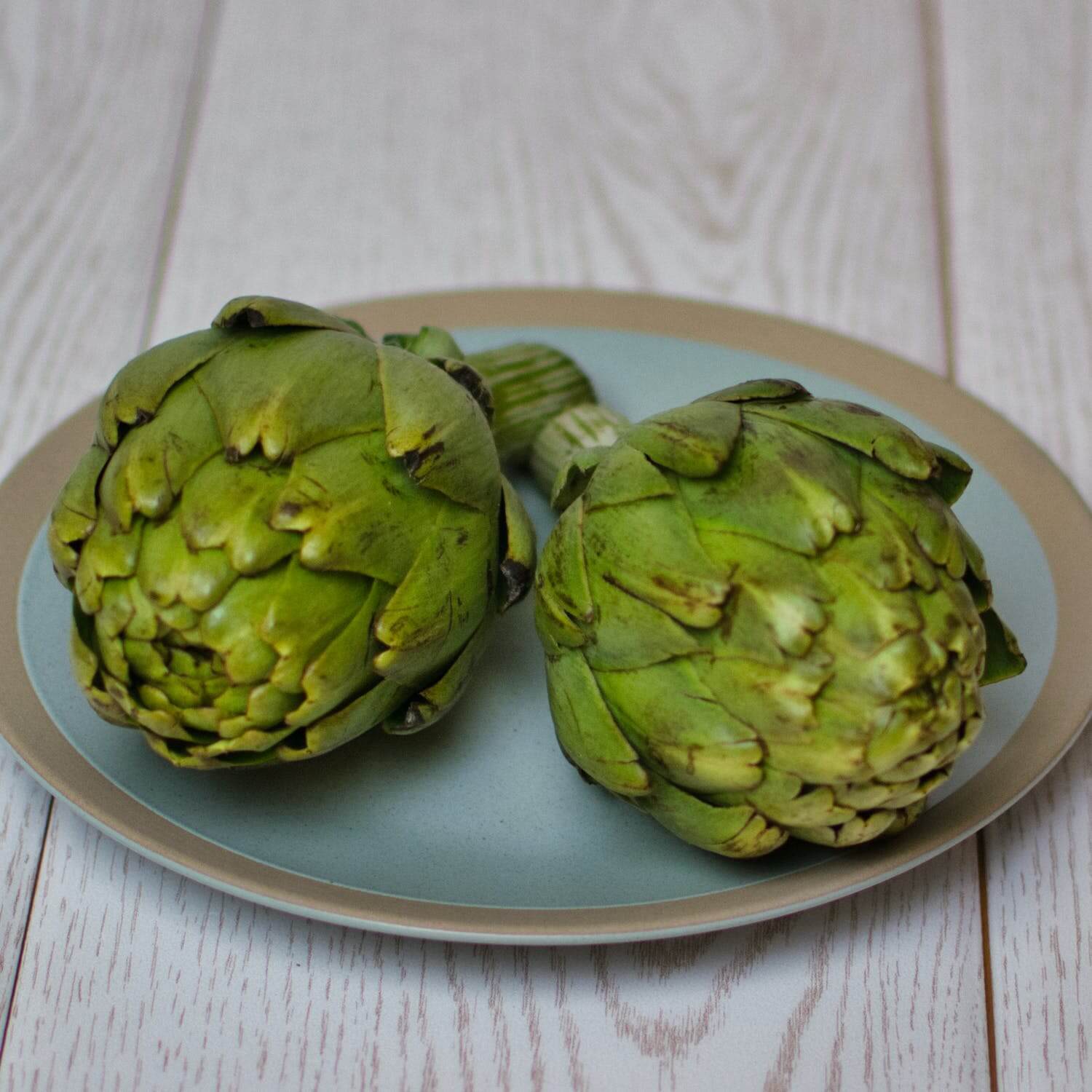
Sometimes mistaken as a common vegetable, artichoke is a popular variety of thistle cultivated as a food. It’s known by different names like globe artichoke, green artichoke, or French artichoke. Its trinomial name is Cynara cardunculus var. scolymus.
When eaten raw, artichoke tastes bitter and firm. That’s why you’d always cook it and then eat it. This way, it will taste like a blender flavor similar to that of boiled potatoes. Besides, the following are some amazing facts about this wonder vegetable artichoke you’d have never heard of.
- Name: Artichoke, Cynara cardunculus var. scolymus
- Type of Food: Thistle
- Total Calories: 60 (medium artichoke)
- Total Fat: 0.2 g
- Total Protein: 4 g
- Total Carbohydrates: 13 g
- Sodium: 120 mg
63 Artichoke Facts for kids
- An artichoke is an unbloomed flower and a part of the sunflower family.
- It is one amongst the oldest food items known to humans.
- A single plant of artichoke can produce over 20 artichokes per year.
- Of all the vegetables known to mankind, artichokes are believed to contain the maximum amount of antioxidant levels, including anti-inflammatory antioxidants.
- Every year, March 16th is celebrated as Artichoke Day.
- All the commercially grown artichokes in the United States of America are grown in California.
- Although artichokes are grown throughout the year, their peak production happens around March and May and smaller ones in October.
- The harvest of the artichoke plant takes place between five to six months of planting.
- For the best quality of artichokes, they must be grown in frost-free areas with cool & foggy summers.
- 6,800 acres of artichoke farmland was harvested in the year 2016.and color. Moreover, the cut given to an emerald determines the richness of the color.
- It is cultivated as an annual or a perennial plant.
- Initially, artichokes are immature flowers that will blossom into bright purple flowers if left to mature.
- Currently, over 50 varieties of artichokes are grown worldwide, with the green globe the most prominent one. It’s commonly found in California.
- They are native to the Mediterranean region.
- It is the official vegetable of Monterey County in California (MCC).
- Castroville is the artichoke center of the world as the majority of the artichokes harvesting takes place here only. It’s a small town in Monterey County.
- Around 6 grams of dietary fiber is present in a large artichoke.
- A medium-sized artichoke contains more fiber than a cup of prunes.
- Artichokes are not poisonous to humans. However, if you are allergic to marigolds or daisies, you are more likely to be allergic to artichokes as well.
- The scientific name of the artichoke is Cynara cardunculus var. scolymus.
- The globe artichoke grows up to 1.5-2 m in length.
- The globe artichoke is low in calories and fat.
- Raw and fresh artichoke is an excellent source of natural folic acid.
- Fresh artichokes contain moderate amounts of Vitamin C.
- Artichokes are an excellent source of Vitamin K
- An artichoke is an excellent source of compounds like silymarin, caffeic acid, and ferulic acid.
- Artichoke is a rich source of minerals like copper, calcium, potassium, iron, manganese, and phosphorus.
- An artichoke is a prominent winter vegetable across the whole of Europe.
- In Vietnam, artichoke leaves are ground up and made into tea.
- Until the 16th-17th century, women were not allowed to eat artichokes.
- Artichokes were earlier believed to have aphrodisiac properties.
- Currently, Italy is regarded as the world’s biggest artichoke producer after the US.
- Artichokes help in digestion.
- Artichokes are considered good for the liver and gallbladder.
- Eating artichokes once a day helps improve your cholesterol levels.
- Artichokes are also used in beer manufacturing in Italy.
- It stimulates the lymphatic drainage system.
- The violet flowers of artichokes are also used as decorative components in gardens and flower beds.
- The edible part of an artichoke is its unmatured flower bud before it blossoms.
- Eating artichokes daily helps improve your heart health as well.
- The most popular Greek recipe made using artichokes is called “Aginares a la polita.”
- Artichoke is either boiled or steamed for eating purposes.
- The taste of a cooked and unseasoned artichoke resembles that of a fried egg white.
- The core of the artichoke stem tastes similar to its heart and is edible.
- The diameter of a standard artichoke plant is around 7.5-8 cm.
- The primary nutrients found in artichokes are dietary fiber (17.89%), copper (16.89%), Vitamin K 17.8 µg (14.83%), and phosphorus (12.57%).
- The significant health benefits of an artichoke plant are that it prevents cancer, promotes heart health, cures hangovers, promotes healthy bones, and improves your brain health.
- An artichoke is known by several names like Globe Artichoke, Prickly Cardoon, Scotch Thistle, Vegetable Rennet, Wild Cardoon and Wood Artichoke.
- An artichoke is an erect, spiny, biennial, or perennial plant.
- The fruit of artichoke possesses a unique nutty flavor and resembles the taste of another green vegetable, asparagus.
- The fruit of artichoke weighs about 150 gm.
- You can find artichoke in Europe and North America during the spring and summer and in the Middle East during the fall.
- Artichokes are rich in antioxidants such as polyphenols, quercetin, and rutin.
- You should also add artichoke to your diet due to its various cancer-fighting properties.
- A study demonstrated that its leaves assist in lowering bad cholesterol and increase good cholesterol.
- It’s believed that artichokes prevent neural tube defects in newborn babies.
- Artichokes increase the density and health of the bones. Thus, they also reduce the risk of osteoporosis.
- Artichokes are rich in manganese and magnesium.
- You can consume artichokes by adding them to your stews, salads, casseroles, soups, and sauces.
- Artichokes may initiate intestinal gas and allergic reactions in people allergic to chrysanthemums, ragweed, marigolds, and daisies.
- Since artichokes cure hangovers, people often take some leaves of artichoke after heavy drinking.
- It regulates bowel movements.
- Artichoke improves liver health by eradicating toxins from the liver as well as the body.
Conclusion
Though an artichoke is called a wonder vegetable, it’s not a vegetable in actual terms. In fact, it’s more of a thistle cultivated as a food. You can eat it raw or boil or steam it as well.
Artichoke Pictures



